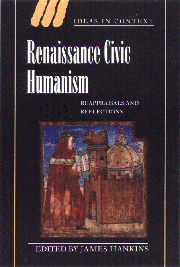Book contents
- Frontmatter
- Contents
- List of contributors
- Introduction
- 1 The republican idea
- 2 “Civic humanism” and medieval political thought
- 3 Civic humanism and Florentine politics
- 4 The two myths of civic humanism
- 5 Rhetoric, history, and ideology: the civic panegyrics of Leonardo Bruni
- 6 De-masking Renaissance republicanism
- 7 Civic humanism, realist constitutionalism, and Francesco Guicciardini's Discorso di Logrogno
- 8 Bruni and Machiavelli on civic humanism
- 9 Rhetoric, reason, and republic: republicanisms – ancient, medieval, and modern
- 10 Situating Machiavelli
- Index of manuscripts and archival documents
- General index
- Ideas in context
Introduction
Published online by Cambridge University Press: 06 October 2009
- Frontmatter
- Contents
- List of contributors
- Introduction
- 1 The republican idea
- 2 “Civic humanism” and medieval political thought
- 3 Civic humanism and Florentine politics
- 4 The two myths of civic humanism
- 5 Rhetoric, history, and ideology: the civic panegyrics of Leonardo Bruni
- 6 De-masking Renaissance republicanism
- 7 Civic humanism, realist constitutionalism, and Francesco Guicciardini's Discorso di Logrogno
- 8 Bruni and Machiavelli on civic humanism
- 9 Rhetoric, reason, and republic: republicanisms – ancient, medieval, and modern
- 10 Situating Machiavelli
- Index of manuscripts and archival documents
- General index
- Ideas in context
Summary
When in 1925 the young German historian Hans Baron, in a short review in Meinecke's Historische Zeitschrift, coined the term “civic humanism” (Bürgerhumanismus), he could not possibly have imagined the extraordinary celebrity and influence this expression, and the political ideal it expressed, would come to enjoy by the end of the twentieth century. The term became well known to historians in English-speaking countries only after 1955, when Baron (now fifty-five years old and an American citizen) published his classic work, The Crisis of the Early Italian Renaissance: Civic Humanism and Republican Liberty in an Age of Classicism and Tyranny. In this study, possibly the most important monograph in Renaissance history written since the Second World War, Baron depicted a Florentine Renaissance that had been inspired to achieve cultural greatness through its devotion to ideals of patriotism, popular government, and public service. These ideals, inherited from ancient Greece and the Roman republic, had been rediscovered and popularized by a politically committed movement of intellectuals and educators whom Baron labeled “civic humanists.” Twenty years later, J. G. A. Pocock, in his equally famous work, The Machiavellian Moment: Florentine Political Thought and the Atlantic Republican Tradition, reinterpreted civic humanism (or “classical republicanism”) as a distinct tradition in early modern political thought. According to Pocock, civic humanism constituted a distinct political discourse which (via a “Machiavellian moment”) had passed from Renaissance Florence to Oliver Cromwell's England, and thence to colonial America, where it formed the ideological matrix of the American Revolution.
- Type
- Chapter
- Information
- Renaissance Civic HumanismReappraisals and Reflections, pp. 1 - 13Publisher: Cambridge University PressPrint publication year: 2000
- 3
- Cited by



